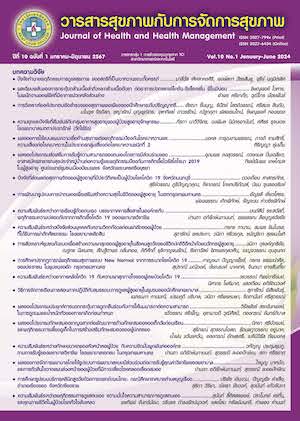The Correlation Between Post COVID-19 Syndrome and Psychological Well-being Among Patients Who Have Been Infected with COVID-19
Keywords:
Post COVID-19 syndrome, psychological well-beingAbstract
This research aimed to explore the level of psychological well-being and the relationship between post COVID-19 syndrome and psychological well-being among patients who have been infected with COVID-19. The sample of three hundred and eighty-four were recruited by simple sampling method. The research instruments included questionnaires on demographic data, post COVID-19 syndrome, and psychological well-being. The content validity index was .81 and .83, and the Cronbach’s alpha coefficient was .82 and .86 respectively. descriptive statistics and Chi-Square test were used for data analysis. The results revealed that 84.4 percent of patients have been infected with COVID-19 had psychological well-being at the high level. The relationship between post COVID-19 syndrome and psychological well-being was statistically insignificant (chi-square = 1.508, p = 0.471). The results of this study highlight the need for clinicians to discuss post COVID-19 conditions and provide adequate support to alleviate stress in patients.
References
กรมการแพทย์ กระทรวงสาธารณสุข. (2564). การดูแลรักษาผู้ป่วยโควิด 19 หลังรักษาหาย (Post COVID syndrome) หรือภาวะ Long COVID สำหรับแพทย์และบุคลากรสาธารณสุข. สืบค้นจาก https://covid19.dms.go.th/backend/Content/Content_File/Covid_Health/Attach/25650126100932AM_%E0%B8%81%E0%B8%B2%E0%B8%A3%E0%B8%94%E0%B8%B9%E0%B9%81%E0%B8%A5%E0%B8%A3%E0%B8%B1%E0%B8%81%E0%B8%A9%E0%B8%B2%E0%B8%9C%E0%B8%B9%E0%B9%89%E0%B8%9B%E0%B9%88%E0%B8%A7%E0%B8%A2%20Long%20COVID%20v.2.4.pdf
กรมการแพทย์ กระทรวงสาธารณสุข. (2565). สำหรับแพทย์และบุคลากรสาธารณสุขแนวทางเวชปฏิบัติ การวินิจฉัย ดูแลรักษา และป้องกันการติดเชื้อในโรงพยาบาล กรณีโรคติดเชื้อไวรัสโคโรนา 2019 (COVID19). สืบค้นจาก https://covid19.dms.go.th/backend/Content/Content_File/Covid_Health/Attach/25650422162203PM_CPG_COVID-19_n_v.22_20220422.pdf
มณฑิรา ชาญณรงค์. (2565). ปัจจัยที่มีความสัมพันธ์กับอาการหลงเหลือภายหลังจำหน่ายออกจากโรงพยาบาลของผู้ติดเชื้อไวรัสโคโรนา 2019. วารสารสุขภาพและการศึกษาพยาบาล, 28(1), 1-16.
เมธาวี หวังชาลาบวร, ศรัณย์ วีระเมธาชัย, และธนกมณ ลีศรี. (2565). ความชุกของภาวะหลังการติดเชื้อโควิด 19 ในผู้ป่วยที่มีประวัติ ติดเชื้อไวรัสโคโรนา 2019 จากการติดตามที่ระยะ 3 เดือนหลังการติดเชื้อ. วารสารศูนย์อนามัยที่ 9, 16(1), 265-284.
สำนักงานการวิจัยแห่งชาติ. (2565). รายงานข้อมูลสถานการณ์การติดเชื้อโควิด 19 ณ วันศุกร์ที่ 30 กันยายน 2565. สืบค้นจาก https://covid19.nrct.go.th/daily-report-30sep2022/
Best, W. J. (1997). Research in Education. Boston MA: Allyn and Bacon.
Blomberg, B., Mohn, K. G. I., Brokstad, K. A., Zhou, F., Linchausen, D. W., Hansen, B. A., ... & Langeland, N. (2021). Long COVID in a prospective cohort of home-isolated patients. Nature medicine, 27(9), 1607-1613. doi:10.1038/s41591-021-01433-3.
Burns, N., & Grove, S. K. (2009). The practice of nursing research: Appraisal, synthesis, and generation of evidence (6th ed.). St. Loius: W.B. Saunders.
Clemente, I., Sinatti, G., Cirella, A., Santini, S. J., & Balsano, C. (2022). Alteration of inflammatory parameters and psychological post-traumatic syndrome in long-COVID patients. International Journal of Environmental Research and Public Health, 19(12), 7103. doi:10.3390/ijerph19127103
Compagno, S., Palermi, S., Pescatore, V., Brugin, E., Sarto, M., Marin, R. …Giada, F. (2022). Physical and psychological reconditioning in long COVID syndrome: Results of an out-of-hospital exercise and psychological-based rehabilitation program. International Journal of Cardiology, Heart, and Vasculature, 16(41), 1-6. doi:10.1016/j.ijcha.2022.101080
Diener, E., Wirtz, D., Tov, W., Kim-Prieto, C., Choi, D. W., Oishi, S., & Biswas-Diener, R. (2010). New well-being measures: Short scales to assess flourishing and positive and negative feelings. Social indicators research, 97, 143-156.
Duarte, F., & Jiménez-Molina, Á. (2021) Psychological distress during the COVID-19 epidemic in Chile: The role of economic uncertainty. PLOS ONE, 16(11), e0251683. doi:10.1371/journal.pone.0251683
Huppert, F. A. (2009). Psychological well-being: Evidence regarding its causes and consequences. Applied psychology: health and well-being, 1(2), 137-164.
Lamontagne, S. J., Winters, M. F., Pizzagalli, D. A., & Olmstead, M. C. (2021). Post-acute sequelae of COVID-19: Evidence of mood & cognitive impairment. Brain, Behavior, & Immunity- Health, 17, 100347. doi:10.1016/j.bbih.2021.100347
Lopez-Leon, S., Wegman-Ostrosky, T., Perelman, C., Sepulveda, R., Rebolledo, P. A., Cuapio, A., & Villapol, S. (2021). More than 50 long-term effects of COVID-19: a systematic review and meta-analysis. Scientific reports, 11(1), 1-12.
Maglietta, G., Diodati, F., Puntoni, M., Lazzarelli, S., Marcomini, B., Patrizi, L., & Caminiti, C. (2022). Prognostic factors for post-COVID-19 syndrome: a systematic review and meta-analysis. Journal of clinical medicine, 11(6), 1541. doi:10.3390/jcm11061541
Malik, P., Patel, K., Pinto, C., Jaiswal, R., Tirupathi, R., Pillai, S., & Patel, U. (2022). Post-acute COVID-19 syndrome (PCS) and healthrelated quality of life (HRQoL)-A systematic review and meta-analysis. Journal of medical virology, 94(1), 253-262.
National Institute for Health and Care Excellence. (2020). COVID-19 Rapid Guideline: Managing the long-term effects of COVID-19. Retired from https://www.ncbi.nlm.nih.gov/books/NBK567261/
Polit, D. F., & Beck, C. T. (2006). The content validity index: Are you sure you know what’s being reported? Critique and recommendations. Research in Nursing & Health, 29, 489-497.
Saltzman, L. Y., Lesen, A. E., Henry, V., Hansel, T. C., & Bordnick, P. S. (2021). COVID-19 mental health disparities. Health security, 19(S1), S-5-S-13. doi:10.1089/hs.2021.001
World Health Organization. (2022). WHO Thailand Weekly COVID-19 Situation Update No. 237. Retired from https://cdn.who.int/media/docs/default-source/searo/thailand/2022_05_25_tha-sitrep-237-covid-19.pdf?sfvrsn=42e15724_1
World Health Organization. (2021). A clinical case definition of post COVID-19 condition by a Delphi consensus. Retired from https://iris.who.int/bitstream/handle/10665/345824/WHO-2019-nCoV-Post-COVID-19-condition-Clinical-case-definition-2021.1-eng.pdf?sequence=1
World Health Organization. (2021). Expanding our understanding of Post COVID-19 condition. Retired from https://apps.who.int/iris/handle/10665/340951
Downloads
Published
How to Cite
Issue
Section
License
Copyright (c) 2024 Journal of health and health management

This work is licensed under a Creative Commons Attribution-NonCommercial-NoDerivatives 4.0 International License.




